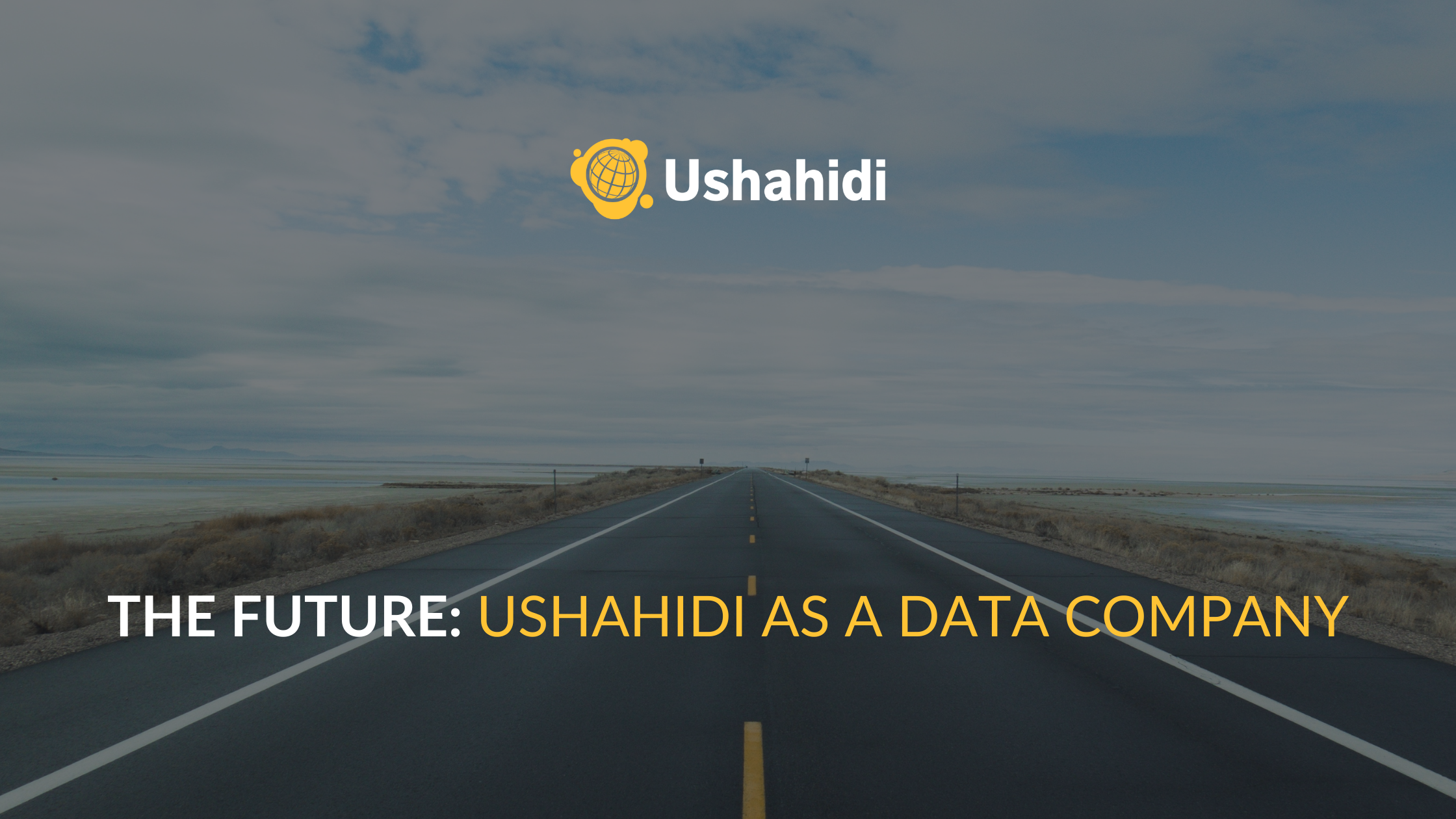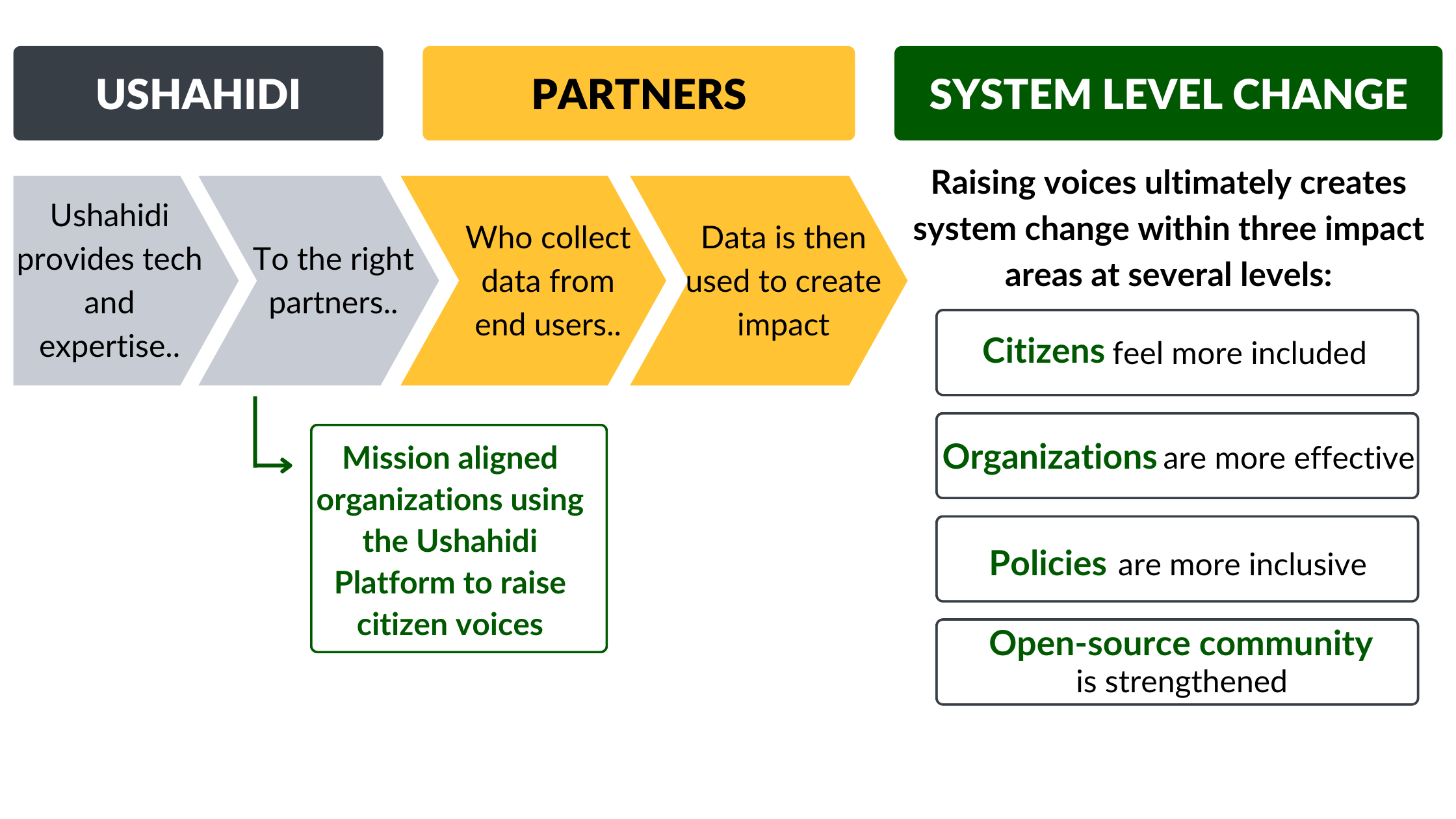Stepping boldly into the future: Ushahidi as a data company

Sep 11, 2023

We cannot achieve meaningful and long-lasting change without knowledge based on inclusive and truthful data.
A few months ago, I shared some thoughts about data equity and the role data has in shaping decisions and driving social change. The discussions that triggered those conversations have advanced further and led me and my team down a deeper path of reflection and discovery.
The digital age has ushered in an era of unprecedented data proliferation, with information flowing from diverse sources, both official and unofficial. Data has emerged as a powerful tool capable of illuminating hidden insights, shaping policies, and fostering collective action. Yet, amidst this sea of information, gaps persist, often excluding the same voices Ushahidi seeks to empower.
Since its inception, Ushahidi has been on a mission to raise the voices of marginalized and underrepresented communities. This empowers them to shape the transformative changes they desire and need in the world.
Our current strategic plan outlines an audacious goal to raise 20 million additional voices, underpinned by a theory of change that illustrates how we get to systems-level change through collaboration with mission-aligned partners.

- Part 1: Ushahidi builds fit-for-purpose technology and offers strategic support and expertise to mission-aligned partners who need our tools to raise citizen voices.
- Part 2: These mission-aligned partners use Ushahidi tools to collect data from marginalized groups and use it to advocate for change or influence policies and decision-making.
- Part 3: Transforming data into information and then into knowledge leads to the systems-level change we’re seeking:
- Marginalized groups become and feel more included in decisions that affect them.
- Organizations become more effective due to access to relevant data.
- Policy development and change are data-driven and more inclusive.
- The open-source movement continues to grow and take root in ensuring that data and technology are accessible to all.
But, something is still missing: We’re not getting to systems-level change as fast as we would like, and this problem is not unique to Ushahidi but plagues the larger data ecosystem as a whole.
Understanding the data landscape: Evolving challenges
Despite the unprecedented possibilities presented by data for decision-making, certain challenges persist and continue to evolve. For data to truly drive meaningful transformation, they must be addressed.
Data inequity and missing voices
The promise of data-driven insights is only as strong as people's access to that data. Unfortunately, data equity remains an elusive goal. Marginalized communities often face barriers that prevent them from contributing to, accessing, and benefiting from data-driven initiatives. This lack of equity perpetuates existing disparities, leaving behind those in need of representation and voice the most.
While technology has provided platforms for individuals to share their experiences and perspectives, not all voices receive equal attention. Many marginalized voices continue to be drowned out, resulting in a skewed representation of reality. This neglect of citizen voices hampers inclusivity and leads to policies and decisions that fail to address different communities' unique challenges.
Data-rich but insight-poor
It is still challenging for decision-makers to extract insights promptly for it to be valuable. Many organizations (and governments) have limited capacity to analyze data and extract insights promptly. Most datasets available exist in multiple formats that are not interoperable. Duplication of efforts continues to persist, with limited data-sharing frameworks making collaboration more difficult. Additionally, current datasets often lack the depth and context to comprehensively understand complex issues. They may focus on quantitative data while overlooking qualitative insights that capture the nuances of real-life experiences. Such data gaps hinder the ability to develop holistic solutions that address the multifaceted nature of societal challenges.
Corruption of the data ecosystem: Mal/Mis/Disinformation
Lies are spreading six times faster than truth in this digital age. Our data ecosystems are being corrupted by dis/mal/misinformation. And it is difficult for us to build policies and make informed decisions based on data that is not truthful.
When our information landscape is tainted by unverified or deliberately false content, it erodes the foundation upon which effective governance and decision-making rest. It hampers our collective ability to address real-world issues and solve problems with evidence-based approaches, as we can no longer trust the data at our disposal.
In essence, the prevalence of falsehoods in our digital age not only undermines the reliability of information but also jeopardizes our capacity, as a society, to create informed, rational, and effective strategies for tackling the complex challenges of our time.
Expanding possibilities of greater impact
In the beginning, Ushahidi focused solely on providing open-source technology. As time progressed, we realized that partners needed more support to leverage our technology tools to be successful. So, we moved into providing strategic support and expertise in deploying our software based on years of on-the-ground experience engaging with marginalized groups.
Our existing strategy and Theory of Change provide a solid framework for raising the voices of marginalized groups. The team and I hypothesize that, in reflecting and recognizing the challenges mentioned above, we need to push our boundaries more and reimagine our role in telling stories with data to shape a more inclusive and equitable world. This realization marked the birth of an audacious and visionary concept that aims to expand the possibilities of data-driven insights.
Now is the time to simultaneously increase the depth and breadth of understanding of citizen-generated data and democratize access to intelligence.
Imagine the possibilities if we could:-
- Empower people to focus on the data they've collected rather than spending time cleaning, organizing, and managing it at scale. Would we tell more stories? Would we focus on what needs to be done based on these stories? Would we act faster?
- Dig deeper into what we know about vulnerable groups by collecting disaggregated data. e.g., Would there be value in questioning the driving forces of the spread of dis/misinformation during crisis situations with a gender lens? How would that influence the fight against dis/misinformation?
- Integrate citizen-generated data with some of the traditional "official" datasets, and how much richer our understanding of various social issues would be. E.g., Could pairing up anecdotal data on financial services with government data help improve social protection programs?
- Make it much easier for anyone, anywhere, to access all citizen-generated data about any issue worldwide, all in one place, at their fingertips. e.g., What would comparing data from Kenya and Nigeria's elections tell us about the state of democracy in Africa? What if we added data from all election monitoring instances in Africa? What could that mean for interventions to protect democracy in the continent?
- Make sure AI models are trained on datasets representing marginalized and vulnerable groups. Could AI be converted into a tool for the good of all rather than just some? Could we make AI a driving force for inclusion rather than exclusion?
The Path Forward: Ideas for a Data-Driven Future
As a team, we’ve outlined a few strategic ideas to lay the foundation for a data-driven future.
Revamped existing Ushahidi Data Models
To bridge existing gaps and ensure marginalized voices are heard, Ushahidi must revamp its data models. By enabling disaggregated data collection based on degrees of marginalization, our users can provide a more nuanced understanding of complex issues. This approach fills data gaps and fosters a more inclusive and representative dataset.
Contribute to building a Responsible AI ecosystem.
As artificial intelligence plays an increasingly significant role in data analysis, we think there is an opportunity to contribute representative datasets for training AI models, ensuring marginalized and vulnerable groups are accurately represented.
Integrate Machine Learning
Machine learning has the potential to streamline data management processes and free up valuable resources for impactful interpretation. By integrating automation and machine learning into our tools, we can enhance the efficiency and effectiveness of data analysis for all our users.
Enhance interoperability of datasets
Recognizing the interconnected nature of data, Ushahidi is actively working to enhance interoperability between its core engine and other tools.
Next steps?
This is the start of an exciting journey for us. We’re strengthening our core offering through our existing strategic plan while embarking on what I believe is the future of Ushahidi.
We’d love to talk to you if you would like to co-create this future with us. We’re keen to learn as we refine our strategy moving forward. Reach out to us via comms@ushahidi.com